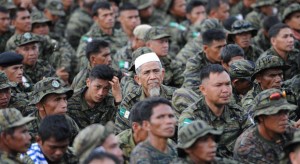Big number of loose guns a problem–MILF
DAVAO CITY, Philippines—Aside from the weapons of more than 10,000 fighters, a huge challenge to the normalization process is the presence of tens of thousands of loose firearms in the areas covered by the new Bangsamoro entity.
Gadzhali Jaafar, MILF vice chair for political affairs, admitted that even among the ranks of the Bangsamoro Islamic Armed Forces (BIAF), the MILF’s armed wing, there were firearms that were not issued by the organization.
“There were some who had firearms who lent them to their relatives who were fighting for us,” Jaafar said.
A military source earlier said that some of the firearms of the MILF fighters had come from private armed groups and political families in the Muslim region which would further complicate the decommissioning process.
If these firearms are not surrendered, they may be used in criminal activities or sold to other armed groups, the source said.
Article continues after this advertisementJaafar said the MILF had already addressed the issue of the loose firearms in the process of normalization but refused to divulge details.
Article continues after this advertisement“We do not want to go ahead of what the independent decommissioning body is planning. But we have already talked about our recommendations,” Jaafar said.
In the Annex on Normalization in the peace accord signed between the national government and the MILF, both groups will assess the plan for the disbanding of private armies.
Diverse approaches
It is not yet clear if it would be a military-led law enforcement operation or a joint operation with the MILF, but both parties agreed the disbanding of private armed groups will use “diverse and appropriate approaches.”
As the panels meet in Kuala Lumpur to discuss the disarmament process, the MILF ensured that all its fighters and supporters would strictly observe the gradual decommissioning of forces.
The MILF, however, repeatedly refused to make public the numbers of its firearms and other armaments, asserting that this was tactical information that would only be divulged at the right time.
As agreed upon under the Annex on Normalization, the decommissioning is defined as a process that includes activities aimed at ensuring a smooth transition for MILF fighters to productive civilian life.
To attain normalization and productivity, a comprehensive needs assessment will be conducted for the rebels and their communities as the basis for the crafting of comprehensive socioeconomic development programs.
An Independent Decommissioning Body composed of Brunei, Norway and Turkey will provide the experts needed for the decommissioning body.
The body is tasked with conducting inventory, verification and validation of BIAF members, weapons and arms, and to develop and implement the schedule for decommissioning.
The most meticulous and critical job of the body is the planning of the design and implementation of techniques and technologies for weapons collection, transport and storage. A joint mines detection and clearing operation will be conducted by the government and MILF in conflict areas to ensure the safety of civilians.
But for now, the most important thing to be settled, Jaafar said, is the immediate passage of the Bangsamoro Basic Law so the normalization process could proceed full steam.
“Without the BBL there will be no Bangsamoro government, and without the Bangsamoro government there will be no decommissioning,” Jaafar said.–Karlos Manlupig
